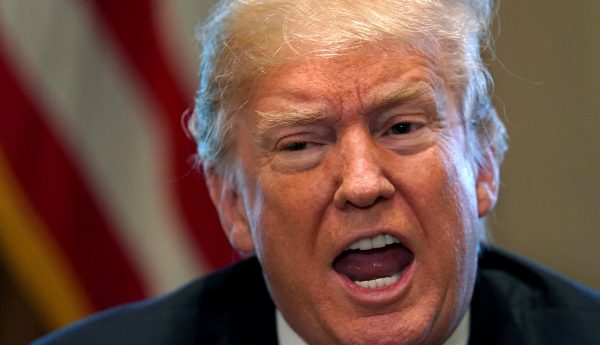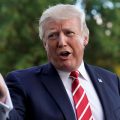
US President Donald Trump said on Monday he is not backing down from the steel and aluminum tariffs he announced last week, despite mounting pressure from both home and abroad.
US House Speaker Paul Ryan said on Monday that he was “extremely worried” about the impact of a trade war, adding that it could undermine economic gains created by the new tax reduction program.
“We’re not backing down,” Trump told reporters during a meeting with visiting Israeli Prime Minister Benjamin Netanyahu in the Oval Office. But Trump also said, “I don’t think you’re going to have a trade war”.
Trump said last Thursday that he will sign measures this week to impose 25 percent tariffs on steel imports and 10 percent on aluminum imports to protect the domestic industries, under Section 232 of the US Trade Expansion Act of 1962, which determines the imports that pose a national security threat.
The announcement, applauded by US steel and aluminum producers, has triggered widespread concerns over possible trade wars with US trading partners.
The US stock market took a hit after the announcement. But on Monday, the Dow Jones Industrial Average closed 336.70 points higher at 24,874.76 amid sentiment that Trump may change his mind under the mounting pressure, especially from his own Republican Party and the US business community. Trump is known for changing his rhetoric from time to time, from the Korean Peninsula to gun control.
Republican senators, such Orrin Hatch of Utah, the longest-serving Republican senator in US history, and Ben Sasse from Nebraska, have criticized the tariffs as a tax on US consumers.
Roberto Azevedo, director-general of the World Trade Organization, on Monday reiterated his concerns over a possible escalation of trade retaliation.
“Once we start down this path, it will be very difficult to reverse direction. An eye for an eye will leave us all blind and the world in deep recession. We must make every effort to avoid the fall of the first dominoes. There is still time,” he told a WTO meeting.
On Monday, Trump again blasted US trade partners who he said take advantage of the US. But he indicated that if Mexico and Canada will make a fair deal in renegotiating the North American Free Trade Agreement (NAFTA), he may exempt them from the tariffs.
The latest round of talks to revamp NAFTA ended in Mexico City on Monday without a trilateral statement from the US, Canada and Mexico. Both Canada and Mexico, major steel aluminum exporters to the US, have vowed to retaliate if Trump imposes the tariffs on them.
Trump also said on Monday he would tax cars from the European Union if they retaliate against his new tariffs. He accused the EU of having “trade barriers that are far worse than tariffs”.
He again equated US trade deficits as a loss for the country, an argument that is dismissed by almost all economists.
“The biggest problem is China, we lost $500 billion,” he said. “How previous presidents allowed that to happen is disgraceful.”
The US trade deficit jumped 12.1 percent in 2017 to $566 billion. That includes $375.2 billion with China, according to the US Commerce Department. Chinese data show the surplus is much lower.
Most economists believe a bilateral trade deficit does not matter, and the US’ trade deficit has more to do with its own macroeconomic policies, saving rates and the role of the dollar as a global reserve currency. Trump’s tax cut measures also are xpected to help expand the trade deficit by stimulating imports.


